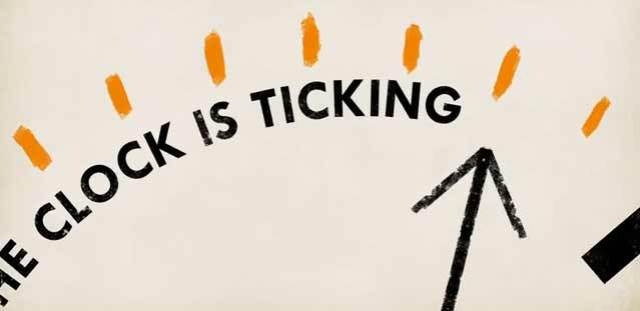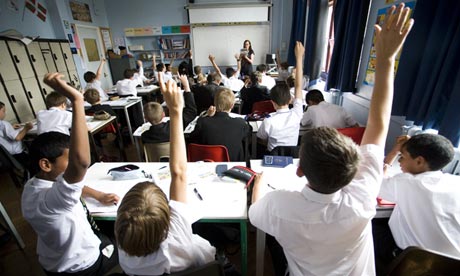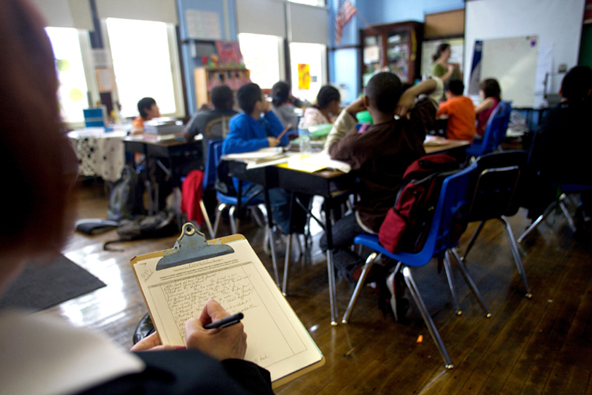
Tick-tock, tick-tock. That time is coming around again. In the not-too-distant future I’m to have my 2nd internal lesson observation of this academic year. The last observation I had spawned an awful lot of blog material for me; but did precisely zero for my self-esteem. I have to say, sadly, that I am no more hopeful this time around.
For those readers who may not be aware, let me briefly explain: I am really, truly dreadful at observed lessons. Deep down I know that I’m a good teacher. I have a good knowledge of my subject (English), and am highly skilled in behaviour management. The kids I teach make really good progress, and I do my very best to work hard and be conscientious and professional. But all of this seems to count for very little in the world of lesson observations. Last term I was awarded the dreaded ‘requires improvement’ grading, following a lesson in which I had tried my very best to meet all the demands of my school’s interpretation of a ‘lesson observation criteria’ checklist. A checklist that mirrors what my SLT think that OFSTED will want to see. They still firmly believe that by judging teachers in this way, they will be pleasing the inspectors when they call.
It has to be said that I didn’t exactly take news of my ‘requires improvement’ grading lightly. In fact I took it very seriously indeed – I began by refusing to sign the observation feedback form. I then complained so much and so often about the whole process that my immediate boss – the Centre Manager – in neutered exasperation, handed the reins of this particular matter over to a more senior leader – the Area Manager.
Several meetings ensued, the last of which actually left me feeling quite reassured. The Area Manager informed me that nothing would happen to me if I got another ‘requires improvement’ grading, as they have no concerns at all regarding my capability as a teacher.
However, the fact that none of the reassurances about my ability have been confirmed in either a letter or email leaves me concerned that I could still be deemed inadequate, and it would be a ‘my word against theirs’ scenario if anything other was ever suggested.

Furthermore, and perhaps even more worryingly, I still cannot for the life of me figure out the new, improved and (supposedly) less prescriptive observation form. I simply fail to see how it is humanly possible to successfully evidence all of the requirements in a single lesson.
In addition to this, there are some statements on that form that seem to make very little sense. I’d be very interested in comments on the following:
To be ‘outstanding’ would require me to be ‘acutely aware of pupil capabilities’ whereas, to be ‘good’ I would only be expected to have a ‘good understanding of pupil capabilities’. How on earth is an observer going to differentiate whether my knowledge of pupil capabilities is ‘good’ or ‘acute’?
In order to be ‘outstanding’ I would have to use ‘effective‘ differentiation strategies; whereas to be ‘good‘ I would only be using ‘good differentiation strategies’. Okay…and the difference is?
Then there’s the statement that refers to ‘excellent references to literacy and numeracy’ as opposed to, ‘good references to literacy and numeracy’ What on earth is it going to take to swing the balance? This is just pedantically playing with words, surely?
But the bafflement continues, There’s the line that suggests that I will be ‘outstanding’ if ‘pupils are fully aware of their target grades..’; but I will only be ‘good’ if ‘pupils know their target grades’. Is there really a significant difference? Surely they either know them or they don’t?
And how about pupils receiving ‘high quality oral feedback and homework’ versus ‘detailed oral feedback and homework’? ‘Detailed’ and ‘high quality’ haven’t got anything to do with one another on any scale anywhere: they are words which may work well together, collaboratively. They aren’t representative of different degrees of anything that I’m aware of.
Then there’s: ‘excellent subject knowledge’ being superior to ‘strong subject knowledge’, and ‘excellent evidence of independent learning’ being pitted against, ‘good evidence of independent learning. The latter is doubly baffling, I think, as even OFSTED don’t necessarily expect to see independent learning in lessons any more.
But the pièce de résistance, I think, is this one: ‘a broad range of resources used, to include new technologies’ trumping ‘a good range of resources used, to include new technologies’. An explanation as to how using a ‘good range of resources’ can possibly be inferior to using ‘a broad range of resources’ would be very welcome.
There are many, many more anomalies on that form; I have selected a few, at random. It is even more alarming when one considers that all of this – plus much, much more – is to be judged in a single 45 minute lesson. I think that the terms ‘subjective’ ‘matter of opinion’ and ‘open to corruption’ could easily be somewhat applicable here?
Recently, our Area Manager was in school. I wasted no time at all in presenting myself in the office, equipped with a copy of the new observation criteria sheet and determined to seek some answers. Our Centre Manager was also present.
I’m not altogether surprised that neither manager was able to answer my questions about the observation form. There were a couple of mumbled suggestions as to what the various linguistic nuances may mean, and how they may be judged, such as: “Well, a pupil might be fully aware of their target grade if they could tell you what their level is straight away, without looking” and: “A good range of resources might not include the full range that you could, potentially, have used”. For some of the queries I made, I simply got the answer, “I don’t know”.
The Area Manager also tried to warn me that our way of observing is “much softer” than the methods which OFSTED now employ. I heard myself trying to explain, for the umpteenth time, that things have changed; that OFSTED are changing. Therefore, there’s no need for all of this any more. But hardly any words came out, and those that did were roundly dismissed.
The conclusion to all of this – following much squinting at the form and ‘umming’ and ‘ahhing’ – was that I should really be voicing these concerns and queries to the Deputy Head who wrote the observation form.
Very interesting. I shouldn’t, then, be asking the people charged with carrying out the observations; the people who have responsibility for ticking the boxes; those people who will be deciding teachers’ grades – and potentially affecting their entire careers. These managers find themselves unable to help me because their whole process is based on criteria tick boxes with semantics so wooly that they cannot be explained or justified, simply because they were written by someone else?

Feeling more than a little desperate and deflated, I returned to my classroom and slumped at my desk. An ever-cheery and relentlessly helpful teaching assistant tried to make useful suggestions such as, “We’ll get some of the kids hot-seating”, “Just make sure we get them working together in groups for a while” and, “Why don’t we get them to act a bit?” Finally she (helpfully) suggested that she would, “take some photographs” of the various ‘activities’ taking place, “as proof.”
Sensing my utter despondency ( – and hearing my silence -) she finally said, “We’ll just give them what they want to see, Caz. It’s just a game, really, isn’t it?”
Is she right? Is it just a game? And if so, why are so many of us still playing it?
There are some glimmers of hope on the horizon. Indeed, some schools have abandoned lesson grading altogether, in favour of developmental and supportive observations. The purpose of these being to discuss good practice and consider areas for improvement in a positive way, without the fear, worry and stigma of having a grade attached. Huge respect to @ChrisMoyse, @murphiegirl and @TWDLearning, among others, for they are truly leading the way in showing that there really are alternative ways of doing things. Let’s just hope that others follow suit.
Please follow me on Twitter: @cazzypot



Reblogged this on skyeblogdotme.
LikeLike
Reblogged this on The Echo Chamber.
LikeLike
Hiya You are great at observed lessons! Everyone one of them is observed by 20 or more kids! It’s the people observing you that are the problem. Perhaps you could ask to be filmed rather than have someone sitting in the room? It’s worked well at a school I know.
LikeLike
Thank you for saying that! Yes, being filmed is something I’ve heard about, and know can be successful. Whether I’d ever get my SLT to agree to that is another matter. Thank you for your comment!
LikeLike
Reblogged this on TWDLearning.
LikeLike
For my last observation I requested that the my ‘grade’ was not shared with me. So heads have to grade teachers but we don’t have to know. After reading research that concluded that even positive feedback can have a negative impact on how teachers improve I felt that this was best way forward. The research shows that in many cases even if someone is given an outstanding they stop improving, why should they think about getting better? They are the best they can be!!!
Not being given a grade completely changed the feedback I was given! My head, deputy head and I found we were talking more about the learning, the strategies and the children and not about me! And of course learning is what we are all about!!! 🙂
LikeLike
Indeed it is! I’m thinking of saying that I don’t want a grade. Whether they’ll accept that or not, I don’t know! Thank you for your comment.
LikeLike
The form is fatuous in the extreme! Lesson observations should not be do or die – they should be triangulated with book scrutinies, pupil progress and attainment data, pupil surveys (if you must!)…And another thing – if they are happy with your performance why do they need to keep observing you?
LikeLike
Because we have 3 observations a year…whether we need them or not. It’s a bit like Elizabeth I and her baths! I agree with you, Julie. There is SO much more to look at than just the teacher teaching. I like the ‘triangulation’ idea. Very sensible. Thank you for commenting.
LikeLike
I think I agree with you. The lesson obs process you describe is a game, clearly.
LikeLike
Indeed it is, Peter.
LikeLike
Reblogged this on Primary Blogging.
LikeLike
That bloody observation form makes me so angry! A complete and utter mess. I am responsible for my school’s lesson obs form and it took weeks to get it right. It seems that your form is just a swapping of adjectives. Appalling. No wonder you feel nervous: how could anyone fulfil such criteria?
LikeLike
The subjectivity of it all is my biggest concern. It’s exactly like Professor Coe said, there is no way that any 2 observers would be able to reach the same conclusions, based on such speculative nonsense as this. I like to spread the anger around: it makes me feel less alone with this! Thank you so much for commenting.
LikeLike
It is a cruel game approached by many observers as a work clearing exercise. Best wishes and good luck, I am still determined not to play this year (until I get a couple of RI then it’s back to playing the game) just get those well behaved children to learn thoroughly.
LikeLike
That is my goal. It’s such a shame it gets interrupted by these unwelcome intrusions! Thank you so much for commenting.
LikeLike
Well,……there will be no consequences if another ‘requires improvement’ is obtained…..and, Deputy Head, Centre Head, Area Head (and I guess, somewhere, National Head)…..says it all. Barmy bureaucracy?
LikeLike
That’s how I see it! Difficult to view it any other way, I think! Thanks for your comment. Much appreciate it.
LikeLike
Hi Cazzy
The whole thing is crazy.
LikeLike
Hi Sue, YOU know that I know that you’re right.
LikeLike
…and thank you for commenting!
LikeLike
Pingback: Lesson Observations: Progress at Last! | cazzypotsblog
Pingback: 2014: Top 5 blogs. | cazzypotsblog